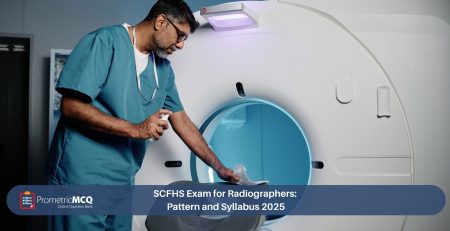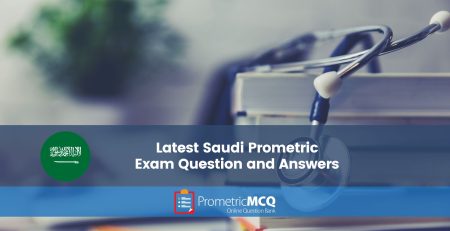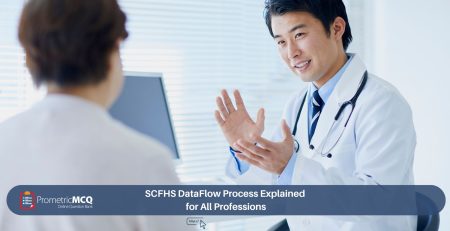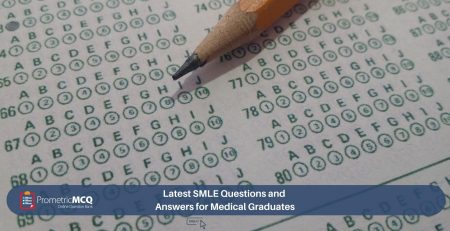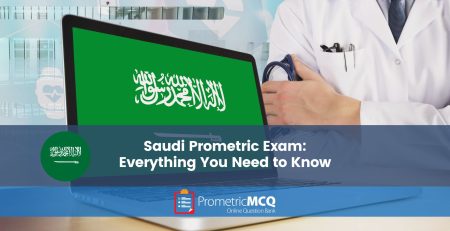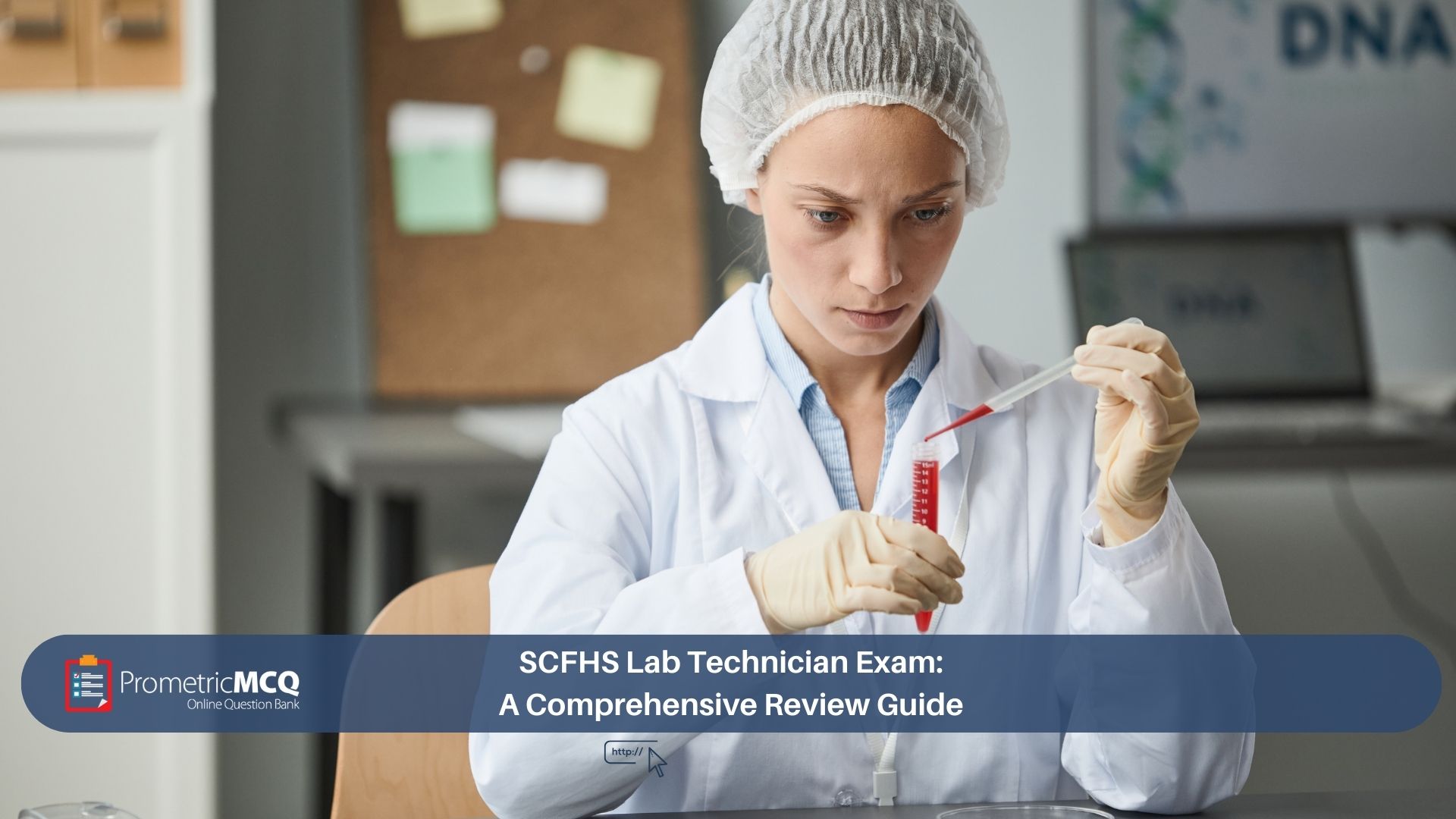
SCFHS Lab Technician Exam: A Comprehensive Review Guide
fatima@prometricmcq.com2025-09-17T20:10:02+00:00Table of Contents
ToggleSCFHS Lab Technician Exam: A Comprehensive Review Guide (2025)
In the rapidly advancing healthcare landscape of Saudi Arabia, medical laboratory technicians are the unsung heroes. As the Kingdom pushes forward with its Vision 2030, the demand for highly competent and certified laboratory professionals has never been greater. The Saudi Commission for Health Specialties (SCFHS) ensures these high standards are met through its mandatory Prometric licensing exam. For any lab technician, passing this exam is the critical first step to a rewarding career in one of the region’s most dynamic health sectors.
The SCFHS Lab Technician exam is a comprehensive and challenging assessment. It is designed to test not just your theoretical knowledge but your ability to apply it in practical, real-world laboratory scenarios. It evaluates your understanding of quality control, your precision in analytical procedures, and your critical thinking skills in identifying and solving problems. Success requires more than just reviewing your college notes; it demands a dedicated, strategic approach to preparation.
This comprehensive review guide is your all-in-one resource for conquering the SCFHS Lab Technician Exam. We will dissect the exam’s blueprint, providing a deep dive into the high-yield topics across all major laboratory sections. You will find a structured study plan, realistic sample MCQs with detailed rationales, and a thorough FAQ section to answer all your questions. This is your roadmap to not just passing, but excelling in the exam and securing your professional license in Saudi Arabia.
Key Takeaways for Exam Success
- Master the Core Four: Hematology, Clinical Chemistry, Microbiology, and Blood Banking make up the bulk of the exam. Dedicate the majority of your study time here.
- Quality Control is Everything: Expect numerous questions on QC principles, interpreting Levey-Jennings charts, and understanding Westgard rules. This is a transversal theme.
- Know Your Normals: You must have the normal reference ranges for common lab tests (CBC, electrolytes, enzymes) memorized. Many questions rely on you identifying an abnormal result.
- Think Analytically, Not Just Technically: The exam tests your ability to correlate lab results with disease states. Don’t just know *how* to do a test; know *why* you are doing it and what the results mean.
- MCQ Practice is Non-Negotiable: A high-quality question bank is the most effective tool to learn the exam’s style and identify your weak areas. The path to success begins with a solid plan for your Saudi Prometric Exam.
Deconstructing the SCFHS Lab Technician Exam Blueprint
A successful preparation strategy begins with a thorough understanding of the exam’s content domains. The SCFHS exam for Lab Technicians is a Computer-Based Test (CBT) consisting of 150 multiple-choice questions with a 3-hour (180-minute) time limit. The questions are distributed across the core disciplines of a clinical laboratory.
| Core Laboratory Section | High-Yield Topics and Concepts for 2025 |
|---|---|
| Clinical Chemistry | This is a major section. Focus on organ function panels (liver enzymes, renal function tests), cardiac markers (Troponin, CK-MB), electrolytes, endocrinology (thyroid function, hormones), and therapeutic drug monitoring. Spectrophotometry and other analytical principles are also key. |
| Hematology & Coagulation | Complete Blood Count (CBC) interpretation is essential. Master the morphology of red and white blood cells in various anemias and leukemias. Understand the coagulation cascade and the interpretation of PT, aPTT, and INR tests. |
| Microbiology | Bacterial identification is crucial. Know the key biochemical tests (catalase, oxidase, coagulase) and differential media for common pathogens. Basic parasitology (identifying common ova and parasites) and mycology are also included. |
| Immunology & Serology | Understand the principles of antigen-antibody reactions. Know the different immunoassay techniques (ELISA, agglutination). Be familiar with serological tests for infectious diseases like syphilis, HIV, and Hepatitis. |
| Blood Banking (Immunohematology) | ABO/Rh typing and discrepancy resolution are critical. Master the procedures for antibody screening, identification, and compatibility testing (crossmatching). Understand transfusion reactions and their investigation. |
| Laboratory Operations & Safety | This is a transversal theme. It includes quality assurance/quality control (QA/QC), interpreting Levey-Jennings charts, lab safety protocols (handling biohazards), and proper specimen collection and handling procedures. |
Top Sample MCQs for the SCFHS Lab Technician Exam
Engage with these questions to understand the style and critical thinking required. Analyze the rationales to deepen your knowledge. For an extensive collection, a dedicated QBank of SCFHS Medical Laboratory MCQs is essential.
MCQ 1: Clinical Chemistry
A Levey-Jennings chart for a daily glucose control shows that the last 7 consecutive data points are all on one side of the mean, but are still within the ±2 SD limits. This pattern represents a:
- Trend
- Shift
- Random error
- Normal distribution
Correct Answer: B
Rationale: This pattern describes a “shift.” A shift in quality control data is defined as six or more consecutive data points falling on the same side of the mean. It often indicates a sudden, systematic change, such as a new lot of reagents or a sudden malfunction in the instrument’s calibration. A “trend” involves a gradual increase or decrease across several points, while a random error would be a single outlier.
MCQ 2: Hematology
A peripheral blood smear from a patient with severe anemia shows numerous macro-ovalocytes and hypersegmented neutrophils (6-8 lobes). Which of the following lab results would be most expected in this patient?
- Decreased serum ferritin
- Increased Reticulocyte count
- Decreased Vitamin B12 and Folate levels
- A positive Coombs’ test
Correct Answer: C
Rationale: The morphological findings of macro-ovalocytes (large, oval red cells) and hypersegmented neutrophils are the classic hallmarks of megaloblastic anemia. This condition is caused by impaired DNA synthesis, most commonly due to a deficiency in Vitamin B12 and/or Folate. Therefore, decreased levels of these vitamins would be the most expected confirmatory finding.
Why other options are incorrect:
A: Decreased serum ferritin is indicative of iron deficiency anemia, which is characterized by microcytic, hypochromic red cells.
B: An increased reticulocyte count indicates the bone marrow is responding to blood loss or hemolysis, not an impairment of cell production like in megaloblastic anemia.
D: A positive Coombs’ test is indicative of autoimmune hemolytic anemia, which would present with different RBC morphology (e.g., spherocytes).
Frequently Asked Questions (FAQs) for the SCFHS Lab Technician Exam
The SCFHS Prometric exams are scored on a scale where the passing mark is 500 out of 800, which is approximately 62.5%. To ensure you pass comfortably, it is highly recommended to aim for a consistent score of 70% or higher in your practice mock exams.
The entire process is online. You begin by creating a Mumaris Plus account on the SCFHS portal, submitting your documents, and waiting for them to be reviewed. Once approved, you will receive an eligibility number to schedule your test date via the Prometric website. A detailed overview can be found in our guide to Saudi Prometric exam registration.
The “Technician” exam is typically for candidates with a diploma degree, while the “Technologist” (or Specialist) exam is for those with a Bachelor’s degree. The technologist exam is generally more advanced, with a greater emphasis on theory, interpretation, troubleshooting, and management principles.
No, there is no penalty for incorrect answers on the SCFHS Prometric exam. It is always to your advantage to answer every single question, even if you have to make an educated guess. Use the process of elimination to improve your chances.
Primary Source Verification (PSV) by the DataFlow Group is a mandatory step to verify the authenticity of your qualifications. Many candidates complete this process before or during their exam application on Mumaris Plus, as a positive DataFlow report is required to complete your professional classification and get your SCFHS license after passing the exam.
Standard international textbooks are the best foundation. Recommended texts include the “Clinical Laboratory Science Review: A Bottom Line Approach” (aka the “Patsy Jarreau book”), “Henry’s Clinical Diagnosis and Management by Laboratory Methods,” and the “Quick Review Cards for Medical Laboratory Science.” However, the single most effective tool is a high-quality MCQ question bank.
They are extremely important. A significant number of questions will provide a patient scenario with a set of lab results, and you must first be able to identify which values are abnormal to even begin to answer the question. You must memorize the common reference ranges for a complete blood count, electrolytes, liver function tests, and renal function tests.
Yes, it is possible and common to have questions with images, particularly in the Hematology and Microbiology sections. You may be shown a picture of a peripheral blood smear and asked to identify a specific cell, or a picture of a gram stain and asked to describe the bacteria.
The guidelines and standards set by the American Society for Clinical Pathology (ASCP) are globally recognized and highly respected. Familiarizing yourself with their general best practices is beneficial as the SCFHS exam is based on international standards.
The most effective way to prepare is by using a question bank that is specifically tailored to the content and style of the SCFHS exam. Look for a resource with thousands of questions, detailed rationales for each answer, and the ability to simulate mock exams. You can find a dedicated and comprehensive QBank at SCFHS Medical Laboratory Exam MCQs.
Conclusion: Your Blueprint for a Successful Career
The SCFHS Lab Technician exam is a rigorous test of your professional competence, designed to uphold the highest standards of healthcare in Saudi Arabia. While the scope of knowledge required is vast, a structured and disciplined approach can lead to a first-attempt pass. By focusing on the high-yield topics, dedicating significant time to MCQ practice, and understanding the principles of quality and safety, you can confidently approach the exam. This preparation is your investment in a successful and rewarding career as a certified laboratory professional in the Kingdom.
Ready to Analyze Your Way to Success?
Our premium SCFHS Medical Laboratory QBank offers thousands of high-yield, exam-style questions with detailed expert rationales and performance tracking to ensure you are fully prepared to pass on your first attempt.

